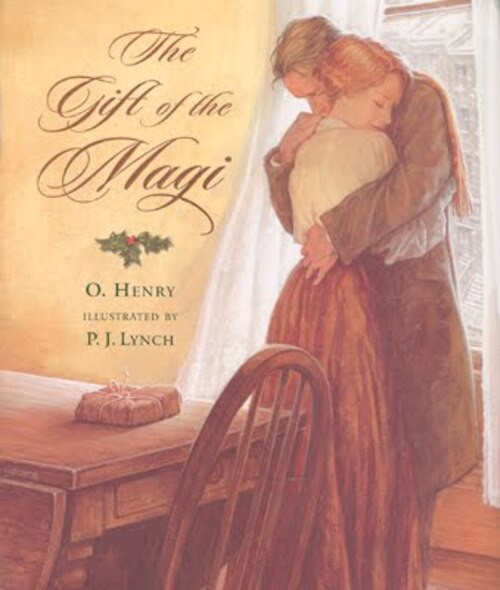O. Henry’s “The Gift of the Magi” stands as a poignant and enduring testament to the power of love and selfless sacrifice. Originally published in 1905, this short story, often anthologized in collections and readily available in The Gift of the Magi book form, continues to resonate with readers across generations. Its simple yet profound narrative explores the depths of devotion between a young, impoverished couple, Della and Jim, as they navigate the challenges of gift-giving during Christmas. More than just a Christmas story, “The Gift of the Magi” delves into universal themes of love, sacrifice, irony, and the true meaning of gifts, making it a compelling read and a staple in American literature.
 The Gift Of The Magi
The Gift Of The Magi
A Summary of Heartfelt Sacrifices
The story unfolds on Christmas Eve, in the humble apartment of Della and Jim Dillingham Young. Della is distraught, having only $1.87 to buy Jim a Christmas present. The narrative emphasizes their financial constraints, highlighting the stark reality of their poverty. Despite their limited means, their love for each other is immeasurable. The story quickly establishes the couple’s two prized possessions: Della’s beautiful, long hair and Jim’s inherited gold watch. These possessions are symbols of their pride and, unknowingly, become central to their sacrifices.
Driven by her deep love for Jim and her desire to give him a worthy gift, Della makes a drastic decision. She resolves to sell her magnificent hair. In a pivotal scene, she visits Madame Sofronie, a hair goods dealer, and sells her hair for twenty dollars. This act of sacrifice underscores the extent of her devotion. With the money, Della embarks on a quest to find the perfect gift for Jim, eventually discovering a platinum fob chain for his cherished watch. The chain is described as simple, elegant, and worthy of the watch itself, reflecting Della’s refined taste and her understanding of Jim’s understated nature.
Meanwhile, Jim has also been making his own sacrifice. Upon returning home, Jim’s reaction to Della’s haircut is initially shocking and unreadable. His perplexing gaze terrifies Della, who fears his disapproval. However, Jim’s silence is not of disappointment but of profound emotion. He reveals that he too has sold his most prized possession – his gold watch – to buy Della a set of beautiful tortoise-shell combs, adorned with jewels, for her long, beautiful hair. The irony is heart-wrenching: each has sacrificed their most valued possession to buy a gift that is now rendered useless by the other’s sacrifice.
Exploring the Rich Themes of “The Gift of the Magi”
“The Gift of the Magi,” readily found within The Gift of the Magi book, is rich with thematic depth, extending far beyond a simple Christmas narrative.
Love and Devotion
At its core, the story is a powerful exploration of love and devotion. Della and Jim’s actions are motivated purely by their selfless love for each other. They are willing to relinquish something deeply personal and cherished to bring joy to their partner. This love transcends material possessions and societal expectations of gift-giving. Their sacrifices are not born out of obligation but from a genuine desire to express their affection in a tangible way, even under difficult circumstances. The story poignantly illustrates that true love is characterized by sacrifice and putting the other person’s happiness above one’s own.
Sacrifice and Selflessness
Sacrifice is the central motif of “The Gift of the Magi.” Both Della and Jim make significant sacrifices, parting with their most prized possessions. These sacrifices are not presented as burdens but as acts of love. The story elevates the act of giving beyond monetary value, emphasizing the emotional investment and personal cost involved. It suggests that the most meaningful gifts are often those that require personal sacrifice, as they are imbued with deeper meaning and emotional resonance. The couple’s selflessness, in a world often driven by materialism, stands as a beacon of genuine human connection.
Irony and Unexpected Twists
O. Henry masterfully employs irony throughout the story, creating a poignant and memorable narrative. The central irony lies in the fact that both Della and Jim’s sacrifices render their gifts mutually unusable. This situational irony highlights the unpredictable nature of life and the often-unforeseen consequences of our actions. However, this irony is not intended to be tragic but rather to underscore a deeper truth. The gifts, though materially impractical, are symbolically invaluable. They represent the depth of their love and the wisdom of their selfless actions. This ironic twist is what elevates the story from a simple tale of hardship to a profound meditation on love and sacrifice.
True Wisdom and the Magi
The title itself, “The Gift of the Magi,” alludes to the biblical story of the Magi, the wise men who brought gifts to the baby Jesus. O. Henry draws a parallel between the Magi and Della and Jim, suggesting that their seemingly foolish sacrifices are, in fact, acts of profound wisdom. The narrator explicitly states that the Magi were wise because their gifts were wise, implying that true wisdom in giving lies not in the material value of the gift but in the intention and love behind it. Della and Jim, in their innocent and selfless acts, embody this wisdom more than anyone else. They understand the true spirit of gift-giving, which is rooted in love and sacrifice, making them wiser than those who give lavish but impersonal presents. The Gift of the Magi book often uses this comparison to the Magi to highlight the story’s deeper message.
Material vs. True Value
“The Gift of the Magi” offers a subtle critique of materialism. While Della and Jim are forced to focus on pennies and dollars due to their poverty, the story ultimately devalues material wealth in favor of emotional richness. Their prized possessions, hair and watch, are symbols of material value, yet they willingly relinquish them for love. The true treasures in their lives are not objects but their love for each other and their capacity for selfless giving. The story suggests that genuine happiness and fulfillment are found not in material possessions but in human connection and acts of love. The gifts they give are not valuable in a monetary sense but are priceless in their symbolic representation of their love.
Character Analysis: Della and Jim
Della and Jim are endearing characters whose actions and emotions drive the narrative of The Gift of the Magi book.
Della Dillingham Young
Della is portrayed as a loving, resourceful, and deeply emotional young woman. Her initial despair over her lack of funds for a Christmas gift reveals her deep desire to please Jim and express her love. Her impulsiveness in deciding to sell her hair demonstrates her passionate nature and her willingness to take drastic measures for love. Della is also practical and efficient, quickly making the decision and executing her plan. Her anxiety about Jim’s reaction after cutting her hair shows her vulnerability and her deep need for his approval and love. Despite her poverty and the emotional rollercoaster of her sacrifice, Della’s love for Jim remains unwavering, making her a sympathetic and admirable character.
Jim Dillingham Young
Jim is depicted as a hardworking, serious, and equally loving young man. His reaction to Della’s haircut is initially perplexing, but it stems from the shock and emotion of realizing the extent of her sacrifice, compounded by his own. Jim’s decision to sell his watch, a family heirloom, is a testament to his deep love for Della and his desire to give her a worthy Christmas gift. His quiet demeanor and understated emotions contrast with Della’s more expressive nature, but his actions speak volumes about the depth of his love. Jim’s final words, suggesting they put their gifts away for a while, reveal his wisdom and understanding of the true value of their sacrifices, solidifying him as a thoughtful and devoted partner.
Literary Significance and Enduring Appeal
“The Gift of the Magi,” often studied as part of The Gift of the Magi book in literature classes, is a masterclass in short story writing. O. Henry’s use of irony, poignant characterization, and simple yet evocative language contributes to its enduring appeal. The story’s themes of love, sacrifice, and the true meaning of gifts are timeless and universally relatable, transcending cultural and generational boundaries. Its message remains relevant in a world increasingly focused on materialism, reminding readers of the importance of human connection and selfless love. The story’s emotional resonance, combined with its literary craftsmanship, ensures its continued popularity and its place as a classic in American literature.
In conclusion, “The Gift of the Magi” is far more than just a Christmas story; it is a profound exploration of love, sacrifice, and the true meaning of gift-giving. Through the poignant sacrifices of Della and Jim, O. Henry delivers a timeless message about the wisdom of selfless love, making The Gift of the Magi book a cherished and reread classic for generations to come.

